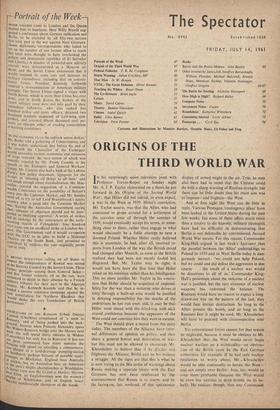—Portrait of the Week
MAJOR GAGAR1N CAME to London and The Queen invited him to luncheon. Herr Willy Brandt sug- gested a conference about German unification and Berlth, to be attended by all fifty-two nations that took part in the war against Nazi Germany. (Some diplomatic 'correspondents who failed to tot up-the number of our former allies to reach this total were thought to have overlooked the gallant and democratic republics of El Salvador and Liberia.) A number of powerful new military aircraft were demonstrated at a Moscow air Show. and the Soviet Union announced that it Would suspend its arms cuts and increase its military expenditure, including that on conven- tional forces. President Kennedy forthwith ordered a re-examination of American military Strength. The Soviet Union signed a treaty with North Korea, which is more than China has ever done; and in South Korea the leaders of the recent military coup were put into gaol by their immediate followers, who also sacked five hundred police and army officers, detained two thousand teacbc'rs suspected of Left-Wing sym- pathies, and arrested fifteen thousand civil ser- vants on charges either of evading conscription or keeping concubines IN itiE ECONOMIC Fill I) the outlook seems darker,' Mr. Butler told a gathering of Conservatives; and it waS widely understood that before the end of tne month the Chancellor of the Exchequer would announce various economies and measures of wage restraint, the very notion of which was roundly rejected by Mr. Frank Cousins in his sPeech to the Transport and General Workers' Union. Mr. Cousins also had a bash at the Labour NrtY's new policy document, Signposts for the Aix/les, as 'meaning all things to all then,' and not tough enough about nationalisation. Mr. Mac- millan rejected the suggestion of a Common- wealth Conference on the possibility of Britain's entry into the Common Market, and Mr, Sandys went off to try to tell Lord Beaverbrook's native Country what a good idea the Common Market was. leaving the Australian Government saying, that, 'absence of objection should not be inter- !'reted as implying approval.' A series of strikes led to sackings by the contractors at the early- warning station at Fylingdales: four hundred men came out on unofficial strike at London Air- Port The Government said it would co-operate writh the LCC in its plan to build a National ilstre On the South Bank, and promised to contribute £1 million—the sum originally prom- ; ;cLI in I 949, BRITISH RESOLUTION calling on all States to respect „ the independence of Kuwait was vetoed at the Security Council by the Soviet Union. Three former gencrals--among them General Salan- and five former colonels, all on the run, were Sentenced need to death in their absence by a French „ rr,'"",d,arY tribunal for their part in the ,Algerian —uurlY. Mr. Kenneth Kaunda said that he in- tended a passive resistance campaign against the ,new constitution for Northern Rhodesia that would shake the very foundations of British government.'' couNciLLORS OF THE Runcorn Urban District DC°uncil (Cheshire) complained of 'a snub to Runcorn and of 'being pushed into the back- Li.°1'11(1,' because when Princess Alexandra opens the Widnes-Runcorn bridge over the Mersey next (wieek she will spend thirty minutes in Widnes p-}anerashire) but only five in Runcorn. It has not Peen announced how many minutes the rineess will spend on unveiling a commemora- c,l.ve Plaque at a land-drainage pumping-station Southport, perhaps because of possible reper- ettssions in Blackpool. England beat Australia at cricket, but an Australian beat an 'American r the men's singles championship at Wimbledon. `1,1 eviet crew won the Grand at Henley; Harrow ,ienati Eton; an Englishwoman won the women's 6,14'es at Wimbledon, and an English boxer 'Came middleweight champion of the world.


































 Previous page
Previous page